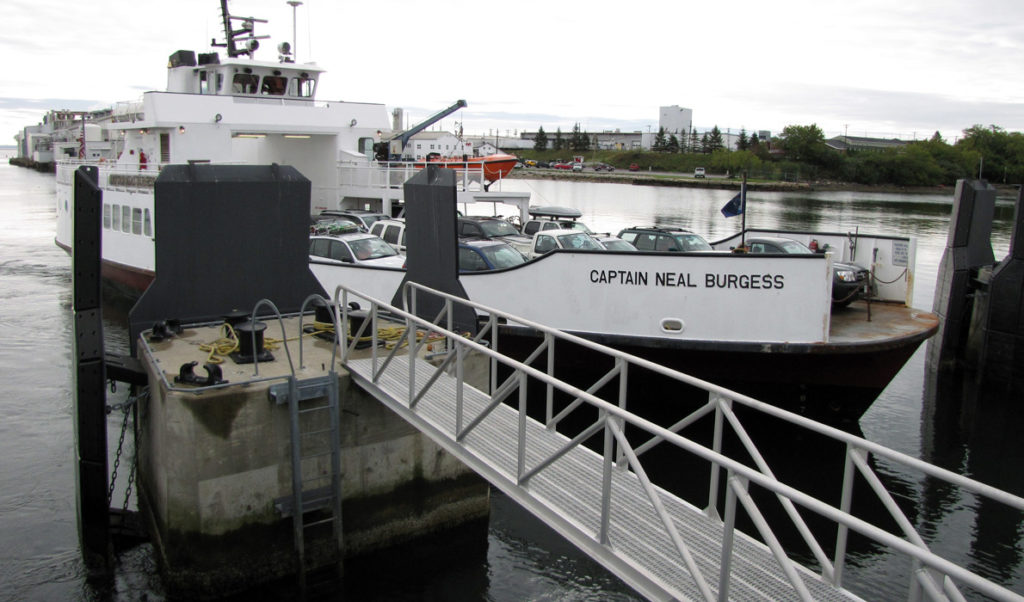A Maine State Ferry Service proposal to raise revenue by creating resident and non-resident rates will be aired at public hearings on Islesboro on Jan. 29 and on Swan’s Island on Jan. 30. A hearing was held on Vinalhaven on Jan. 23.
The plan also would eliminate the current discount on island-purchased tickets, a practice ferry service managers say is on shaky legal ground.
The new plan would raise adult walk-on, round-trip passenger rates for Maine residents traveling to and from Vinalhaven, North Haven, and Swan’s Island from $9.75 (the current rate for tickets purchased on-island), to $12, regardless of where they are purchased.
Out-of-staters would see walk-on, round-trip passenger tickets for the three islands go from $17.50 (the current mainland rate) to $19, regardless of where purchased.
A round-trip ticket for a vehicle for the three islands for an out-of-stater will be reduced from $49.50 (now charged at mainland terminals) to $44. Maine residents will pay $29 for a round-trip vehicle ticket, up from $27.25.
For Islesboro, an adult passenger round-trip ticket will cost $7 for a Maine resident, up from $5.50 for an island-purchased ticket. Non-residents will pay $14, up from $10 for mainland-purchased tickets.
Similar hikes are planned for Frenchboro and Matinicus, the other islands that rely on the ferry service.
The rate hike plan, which awaits final approval, is aimed at bringing in more revenue. Ferry service officials have said state statute requires half of its revenue to come from fares, and in recent years, that threshold has not been met.
Last April, the ferry service floated a plan before a citizen advisory board that would have created summer and off-season rates. The idea was to cushion islanders from some of the impact of the higher rates. But members of the advisory board said many islanders travel to and from the mainland more frequently in the summer, often because of business activity.
Ferry service managers discussed other options, but presented the seasonal rates and the resident/non-resident rates to Department of Transportation Commissioner David Bernhardt. The commissioner chose the resident/non-resident plan.
At a Jan. 11 ferry advisory board meeting in Rockland, members said they would have preferred a flat, across-the-board rate increase.
Rick Dubois, multimodal manager at DOT, suggested the across-the-board increase may not have worked because 80 percent of ferry tickets are purchased on islands, at a discount. If rates were increased, more of the discounted tickets might be purchased, which would fail to raise the needed revenue.
And DOT lawyers, he said, advised managers that island discounts could not be defended legally.
At a meeting last year, Dubois said only $4.5 million of the $11 million spent annually to run the service came from ticket sales and parking fees. The remainder comes from the state highway fund. DOT wants to strike a 50/50 balance between fares and highway fund money.
At the Jan. 11 advisory board meeting, members were skeptical about DOT’s plan.
Janet Anderson, Islesboro’s town manager and its representative to the advisory board, said residents didn’t like a system pitting year-rounders against summer folks. She also asked how residency would be determined.
“We’re still working out the procedure,” Dubois said, “but if someone doesn’t have an ID, they’re not getting the (Maine resident) discount.”
Anderson asked about children, and whether everyone in a car would be asked for an ID.
“Probably not,” Dubois said.
In answer to a question from board member Lisa Shields of North Haven, Dubois said the new system would be implemented on March 28, giving the service time to work out any problems before the busy summer months.
Shields and others expressed doubt the new system would be running smoothly by July 4. She also argued that an across-the-board rate hike would have provided the needed revenue.
“It’s still incomprehensible to me why we didn’t do that,” she said.
Dubois cited a September advisory board meeting at which members indicated their disapproval of the flat rate increase, and said DOT analyzed dozens of rate scenarios, settling on the resident/non-resident plan. He said he personally supported the seasonal rate hike.
The islanders who serve on the advisory board also objected to what they said was an “us vs. them” approach.
Sonny Sprague of Swan’s Island, a selectman there, noted that of the 775 property-tax bills the town sent out, just 387 went to Maine residents.
“Our out-of-state taxpayers pay more than 50 percent to keep our town going,” he said. “I don’t think it’s right.”
Joe Stone, North Haven’s town manager, agreed with Sprague, saying 85 percent of the island’s property taxes were paid by summer residents.
On another matter, ferry service manager Mark Higgins said terminal staff will complete monthly customer service training in Rockland, a move greeted with approval by advisory board members. Many islanders have said ferry service staff, particularly those who manage the vehicle lines, are rude and unaccommodating.





